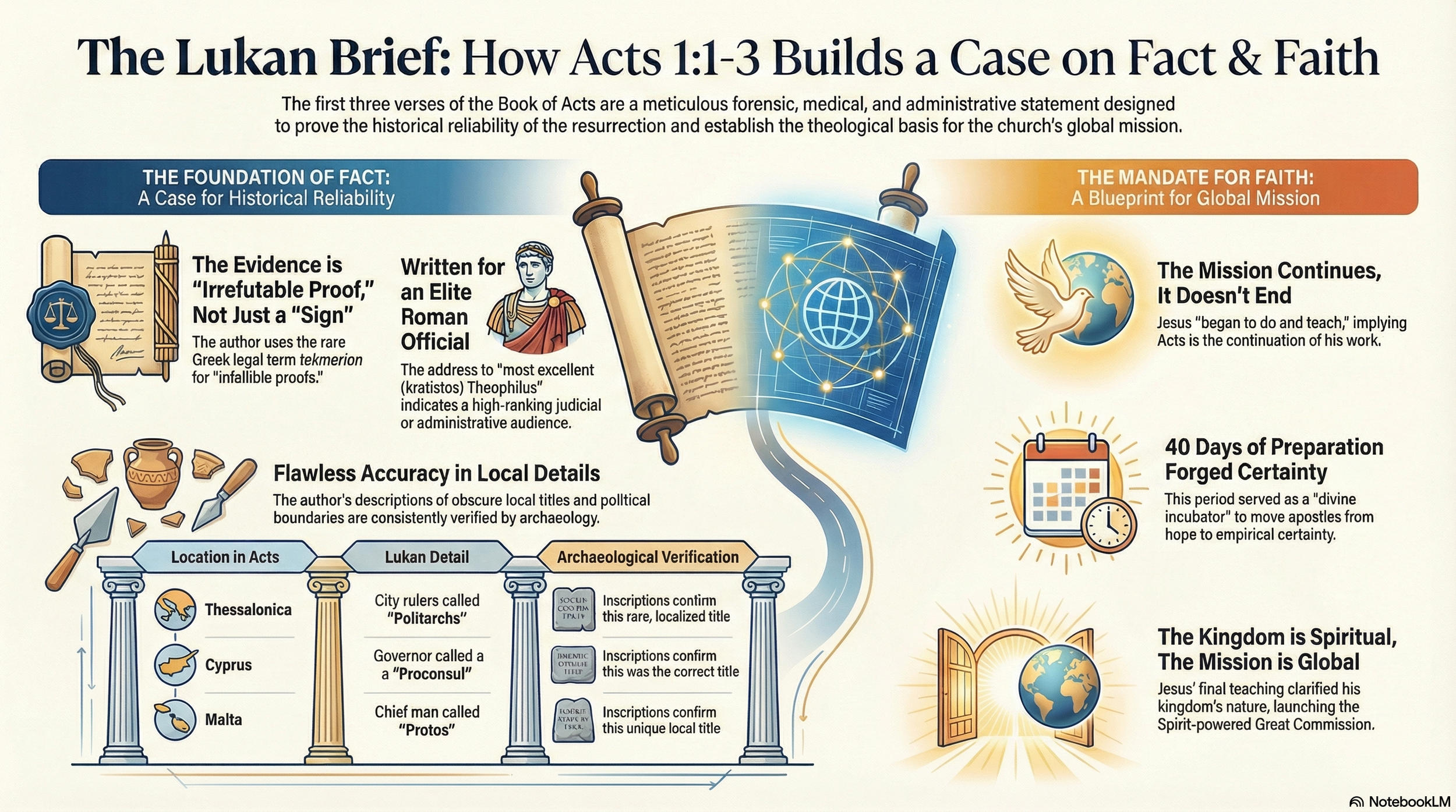The Case for the Resurrection: Was it Provable?
The Book of Acts is not a collection of religious myths; it is a high-stakes legal report. The author, a physician named Luke, didn't ask his readers for blind faith. Instead, he asserted that Jesus proved He was alive through what Luke calls tekmerion—a technical term for "infallible proof."
In the first century, tekmerion was the "gold standard" of evidence used by doctors for diagnosis and lawyers to win trials. By using this term, Luke signals that the Resurrection was a physical, historical fact—seen, touched, and verified. Writing while eyewitnesses were still alive, Luke’s account remained unrefuted in a land where many knew the participants. Addressing his report to the high-ranking Roman official Theophilus, Luke maintained meticulous accuracy. From archaeological details to precise municipal titles, Luke proves himself a reliable investigator, providing an "orderly account" (v. 3) you can trust.
🔍 Explore the Evidence Through Six Lenses
To see the "Unbroken Thread" in this passage, we look through these six forensic lenses. Use the queries below (and your own) to explore “deeper evidence” in our Research Hub.
Lens 1: The Great Commission: In Acts 1:1-3, the Great Commission is "re-booted." Luke’s mention of what Jesus began to do (v. 1) implies a strategic hand-off. The 40-day masterclass was an executive briefing for a global mission, establishing the authority for everything that follows.
Investigative Query: "How does the '40-day' instruction period in Acts 1:3 serve as the strategic foundation for the Great Commission?"
Lens 2: The Holy Spirit: The Spirit is the "Internal Power" of the mission. Even before Pentecost, we see Jesus giving commands through the Holy Spirit (v. 2). This lens reveals that the Spirit is the indispensable lifeblood and administrative guide of "the Way."
Investigative Query: "What is the significance of Jesus giving orders 'through the Holy Spirit' in verse 2?"
Lens 3: The Gospel: The "Exact Truth" of the Gospel is anchored in the Resurrection. By providing tekmerion—infallible proofs (v. 3)—Jesus ensures the core message is not a philosophy, but a verified historical event that demands a verdict from the reader.
Investigative Query: "How does the 'tekmerion' standard in verse 3 protect the integrity of the Gospel message?"
Lens 4: Prophecy Fulfillment: Jesus spent His final 40 days opening the minds (v. 3) of the disciples to the Old Testament. This lens traces how the Resurrection fulfills the ancient patterns of the Law, Prophets, and Psalms, proving the "Unbroken Thread" of God's plan.
Investigative Query: "Which Old Testament themes did Jesus likely use during the 40 days to prove His identity?"
Lens 5: The Response (Accepted or Opposed): Theophilus represents the "Accepted" response of a high-ranking seeker. This lens examines how Luke’s forensic precision was a tactical move to gain credibility within a skeptical Roman legal and social system.
Investigative Query: "How does the address to 'Most Excellent Theophilus' reflect the Roman response to the early Church?"
Lens 6: The Bridge to the Epistles: This passage establishes the Kingdom of God (v. 3) as the central theme that later appears in the letters of Peter and Paul. It is the theological "DNA" that connects the history of Acts to the instructions in the Epistles.
Investigative Query: "Connect the 'Kingdom' teaching in Acts 1:3 to the theological themes found in Peter's letters."

